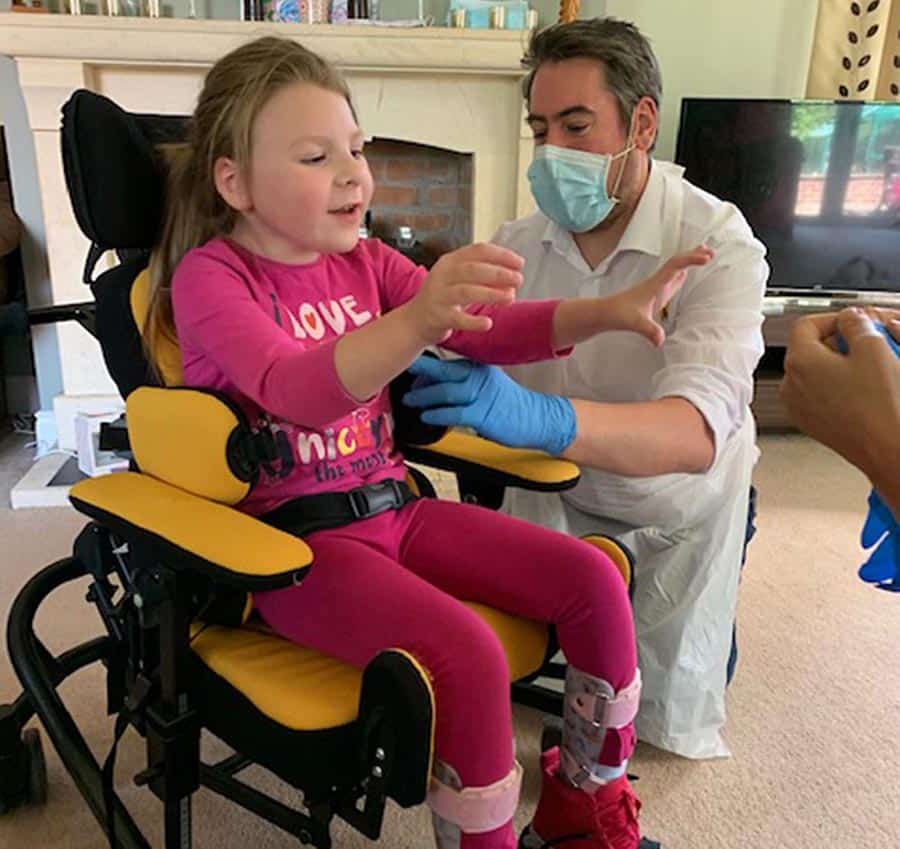Guest article: How Jiraffe adapted specialist services for children’s postural management during lockdown


The importance of postural management for the health and wellbeing of children and adults cannot be understated and after more than 14 months living under several lockdowns and COVID-19 restrictions, it has been even more important to adapt services to ensure people receive the products and care they need.
In this article, Richard Harvey, National Clinical Training Manager at Sheffield-based postural support specialist Jiraffe, explains more.
“Posture is the attitude and configuration of the body against the constant struggle from the force of gravity, and postural management is the holistic approach to managing the posture, movement and function of those who cannot do it themselves – 24 hours a day, 7 days a week.
“If we don’t manage the posture of people who have limited movement and function, there are several potential health risks – including respiratory problems, musculoskeletal deformities, formation of contractures, compression of internal organs and pressure-related skin integrity issues.
“When the first lockdown was announced back in March 2020, we knew we needed to adapt our services to provide provision for those who were unable to access products and the specialist guidance that they needed. In response, we launched our Emergency Posture Provision (EPP) which has allowed children and families to continue their 24-hour postural management regime with an affordable, flexible option that supports our customers.
“In a time when home visits and in-person meetings have been restricted, we adapted by providing virtual production demonstrations, product set-ups and training and education sessions for our customers. This meant that people were still able to access everything they needed to, in a safe and convenient way.
“As we know that gravity is the main force to impact our posture, unfortunately we cannot escape it. That is why a 24-hour approach to postural management is so important.”
If posture of people who have limited movement and function is not managed correctly, there are several potential health risks, Jiraffe highlights, including respiratory problems, musculoskeletal deformities, formation of contractures, compression of internal organs and pressure related skin integrity issues.
All issues caused by poor postural management can lead to pain, secondary complications and, in the worst-case scenario, can become life-shortening.
There are a number of interventions used in postural management, including surgical and medical. Occupational therapists (OTs), physiotherapists (PTs) and carers will usually focus on therapeutic intentions and the use of specialist equipment.
Richard says: “We have been able to offer extra support to families and therapists over the last 14 months by providing online webinars and sessions to help provide specialist expertise to ensure good postural management support at home. The Rifton Pacer in particular has been successful under the EPP scheme as it allows children to stay mobile at home.
“It is paramount that children are kept as mobile as possible and are able to be on their feet where possible as there is evidence it helps improve bone mineral density and hip formation.
“We also introduced our ‘Here to Help’ campaign in March 2020 which saw us go the extra mile for our customers and collect equipment up from schools and drop them at their homes.”
Equipment such as that produced by Jiraffe follows the three key principles and aims of postural management.
Richard explains: “These are function – to allow a person to be as independent as possible; to minimise damage, reducing or preventing the risk of musculoskeletal deformity; and reduction of energy expenditure by helping to reduce fatigue, allowing the person to be more independent and functional.
“The equipment must be right for the individual child – a thorough assessment of a child’s postural needs gives a clear picture of what support is required. And while we want to build upon strength, flexibility and function wherever possible, it’s also vital to remember that the position a child adopts may change, so having flexible, adjustable solutions is as important.
“Jiraffe products cover the full 24-hour period of postural management, including sitting, standing, sleeping, mobility and walking – promoting as much active movement as possible. Equipment is modular, too – it can be built and adapted around an individual child’s needs.”
With accessories available to manage and prevent destructive postures, Jiraffe is also able to correct and accommodate asymmetries in a child’s posture depending on their individual fixations and offer expert education and support to our customers.
Expertise is equally as important as producing the right equipment and Richard adds that Jiraffe is at the forefront of training of staff to further ensure every child receives the highest quality input from the team.
External training is complemented by in-service development; members of Jiraffe’s team regularly attend and speak at national and international conferences to gain and share knowledge in the latest findings, involving as many experts as possible in its processes.
Having a highly-skilled workforce enables the postural support specialist to better support its therapists and the children it works with, ensuring that its team is equipped to provide the highest possible service to its clients.
For more information about Jiraffe, visit the website or call 0114 285 3376.

